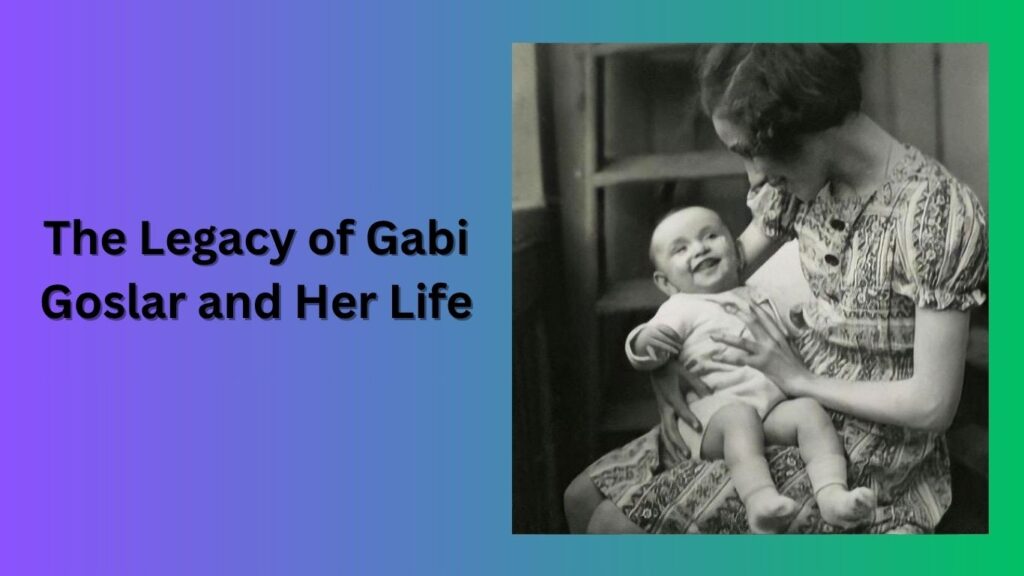Gabi Goslar, whose real name is Rachel Gabriele Ida Goslar and was born on October 25, 1940, in Amsterdam, Netherlands, shows how strong people can be even in the worst situations, like the Holocaust. Gabi is a strong character, and her story is intertwined with important events in history. It shows not only how to survive, but also how strong friendship can be over time.
Early life and family history
Her parents, Ruth Judith Klee and Hans Yitzkhak Goslar, were both German Jews who fled their homes and raised their children in a Jewish family. As Berlin’s deputy minister for home affairs, her father had a high-profile job that showed how stable their family life used to be. This feeling of safety was broken, though, by the chaos of World War II.
Gabi’s mother died while giving birth to her in 1942, and then her grandpa died in 1943. Both of these events were very sad. The terrible things that happened soon after these family losses made them even worse.
How War Changes Things
As the Nazis’ persecution of Jews stepped up in 1943, her father bought the family Paraguayan IDs, which kept them from having to leave the country for a short time. Finally, though, they were taken to Westerbork, a transfer camp in the Netherlands.
Gabi Goslar had terrible ear infections during this time and spent a lot of time in the hospital. The family was sent to Bergen-Belsen on February 15, 1944. Bergen-Belsen was a notoriously harsh prison camp.
She had a very hard time in Bergen-Belsen. The horrors of the camp were always there, even though they lived in a somewhat better area set aside for Palestinians.
When Gabi’s sister Hannah got sick, Mrs. Abrahams, a mother of seven, took care of her. This showed how compassionate people are, even when things are hard.
Freedom and Life After the Battle
Hans Goslar died on February 25, 1945, adding to the tragedy. Gabi and her sister were the only ones left of the Goslar family when they were freed in April of that year. Hannah had to go to the hospital because she was sick, and she found safety at a children’s home in Laren.
Otto Frank, who was married to Anne Frank, became a father figure in Gabi Goslar’s life after the war and was very important to her. Hannah and her family were sent to Geneva, Switzerland, to live with their uncle in the end. She moved to Israel when she was only nine years old, in 1949. It was another step on her path to healing and rebuilding her life.
A bright future and friendship that lasts
They lived in Petach Tikvah after getting married in Israel to a man whose last name was Mozes. She chose to live a private life, but she came back to the public eye in a moving way when the memory stumbling blocks for her parents were unveiled near where they used to live in Germany. This act was both a respect to family and a way to remember all the people who died in the Holocaust.
The friendship with Anne Frank is still an important part of her life story. They were childhood friends, but because of the war, their lives went in very different directions. Their lasting friendship shows how important friendship is in hard times.
Arguments and a Memoir
Because of what she went through after the Holocaust, Gabi Goslar now fights for peace, understanding, and tolerance. In 2010, she wrote a book called I Have to Tell Someone, in which she talked about her scary experiences and the lessons she learnt from living through such an unbelievable past. One of the stories is a personal one, but it also speaks for people whose voices were shut down by the Holocaust.
She has made a big difference by working as an advocate and stressing how important it is to be kind, accept others, and stand up to bias. Her story is a powerful lesson of how strong the human spirit is and how important it is to keep hoping even when things look bad.
What Gabi Goslar Left Behind
Gabi Goslar’s life shows themes of strength, loss, and friendship, and it represents the lives of many others who went through similar things during one of the worst times in human history. The trip left behind a message about how important it is to remember and fight for a world free of hate and discrimination.
People are still moved by the story, which shows that hope and strength can win even in the face of sadness. Her presence is like a bright light, creating a space of hope and memory that lasts beyond time and shows future generations how strong they are when things don’t go as planned.


